 Common Problem
Common Problem Do you know if you cancel the other person immediately after following them on Douyin?
Do you know if you cancel the other person immediately after following them on Douyin?Cancel immediately after following Douyin without the other party knowing. The reasons are as follows: 1. Douyin does not have a notification function for unfollowing, which means that the followers will not immediately know that the followers have canceled following them; 2. If the followers cancel every time If all users receive notifications, it may cause trouble and unpleasant feelings to users; 3. Douyin has a huge number of users, and there will be a large number of follow and unfollow operations every day. If every user receives a notification, it will cause trouble to the server. Brings tremendous pressure.

The operating system of this tutorial: ios16.6 system, Douyin version 26.7.0, iphone14 mobile phone.
Douyin is a short video sharing platform that is popular around the world and has a huge user base. On Douyin, users can publish their own short video works, and they can also follow other users and like and comment on their works. However, sometimes users may follow a user and then immediately unfollow it, which raises a question: Will the followed user receive a notification immediately?
First of all, we need to understand Douyin’s following mechanism . When a user follows another user, the followed user will receive a notification letting them know that a new follower has followed them. This notification displays the follower's username and reminds the follower that they can click to view the follower's profile. This means that users who are followed will immediately know that someone is following them.
However, when a follower unfollows, the followed person will not be notified immediately. Douyin does not have a notification function for unfollowing. This means that the person being followed won't immediately know that the follower has unfollowed them.
Why doesn’t Douyin have a notification function for unfollowing? This may be due to user experience considerations. If followers were notified every time someone unfollowed them, it could cause confusion and unpleasant feelings for users. In addition, Douyin has a huge number of users, and there are a lot of follow and unfollow operations every day. If every user receives a notification, it will put huge pressure on the server.
Although followers won’t immediately know that a follower has unfollowed them, there are ways they can find out. First, the followers can view the follower status in their own follower list. If a user disappears from your follow list, it's likely that they unfollowed them. Secondly, the followers can find out whether someone has unfollowed them by checking their number of fans. If the number of followers has decreased, it is likely that someone has unfollowed you.
For the followers, following and unfollowing is just a social behavior on the Douyin platform and should not be taken too seriously. Douyin is an open platform, and each user has his own preferences and interests. Following and unfollowing is just a choice between users. On Douyin, users can freely follow and unfollow other users, which is one of the features of the platform.
In short, users’ following and unfollowing behaviors on Douyin will not immediately notify the followers. Followed people can find out whether someone has unfollowed them by checking the following list and the number of fans. However, following and unfollowing is just a social behavior on the Douyin platform and should not be taken too seriously. On Douyin, users should pay more attention to their own creation and sharing, rather than obsessing too much about following and unfollowing. .
The above is the detailed content of Do you know if you cancel the other person immediately after following them on Douyin?. For more information, please follow other related articles on the PHP Chinese website!
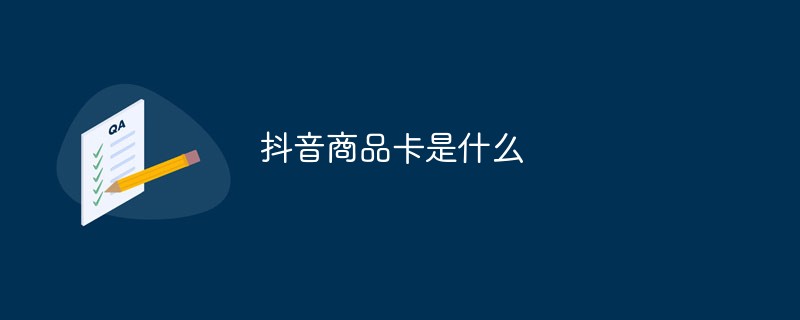 抖音商品卡是什么Nov 03, 2022 am 10:48 AM
抖音商品卡是什么Nov 03, 2022 am 10:48 AM商品卡是一种可在抖音关注流中直接分发的商品形态,它可以帮助商家多维度展示商品,更加突出展示商品细节及用途,让粉丝用户对商品有更多了解,提升用户浏览停留时长,从而辅助提高商品的粉丝触达率及商品转化,也可通过发布粉丝专属商品提高粉丝复购。
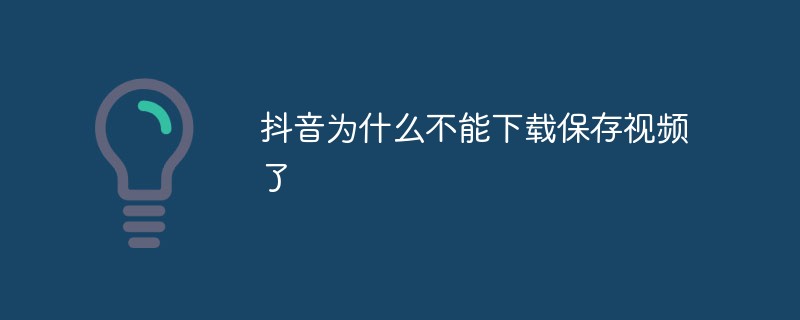 抖音为什么不能下载保存视频了Apr 25, 2023 pm 12:12 PM
抖音为什么不能下载保存视频了Apr 25, 2023 pm 12:12 PM抖音不能下载保存视频的原因有:1、视频作者关闭了“允许下载”权限,没有办法解决;2、作品优质,平台限制其他用户下载,无法解除;3、网络故障所致,切换网络或重启App即可解决。
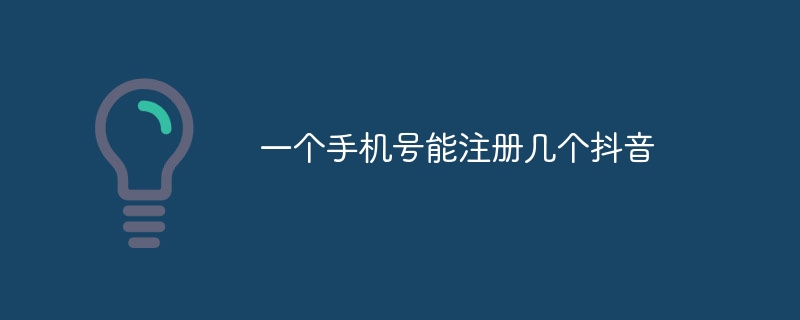 一个手机号能注册几个抖音Jun 15, 2023 pm 01:11 PM
一个手机号能注册几个抖音Jun 15, 2023 pm 01:11 PM一个手机号只能注册一个抖音,注册抖音的步骤:1、点击抖音进入主页面之后,点击页面中的“我”这一选项;2、页面将会进入登录页面,点击页面中的“其他手机号码登录”;3、切换页面之后,勾选页面上方的用户协议,再输入手机号,最后点击“验证并登录”即可注册抖音了。
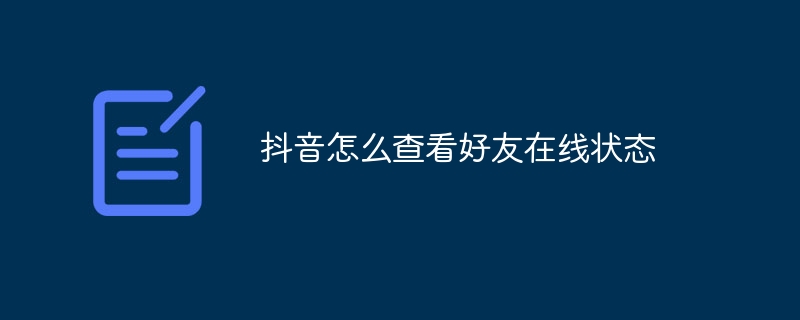 抖音怎么查看好友在线状态Sep 08, 2023 pm 04:58 PM
抖音怎么查看好友在线状态Sep 08, 2023 pm 04:58 PM抖音查看好友在线状态方法有查看他人主页、私信聊天、查看好友动态、使用“看一看”功能等等。详细介绍:1、查看他人主页,可以通过搜索好友的名字并进入其主页中,来看到好友最新发布的视频和动态,如果好友最新发布的视频中有一些互动以及评论,那么说明好友正在抖音上活跃;2、私信聊天,通过私信聊天的方式来直接联系好友,已读就证明在线;3、查看好友动态等等方法。
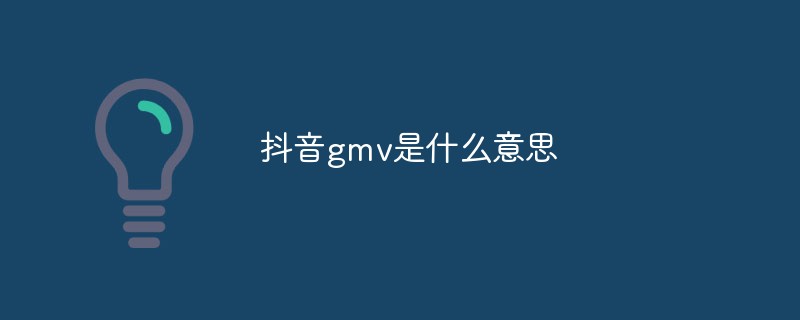 抖音gmv是什么意思Oct 26, 2022 pm 03:07 PM
抖音gmv是什么意思Oct 26, 2022 pm 03:07 PM抖音gmv是指一定时间段内成交总额,可以叫商品交易总额或者电商结算的成交总额,常用于电商平台对交易规模的衡量,换算关系“gmv=销售额+取消订单金额+拒收订单金额+退货订单金额”;gmv虽不是实际交易数据,但同样可以作为参考依据,因为只要顾客点击购买,都会统计在gmv里面。
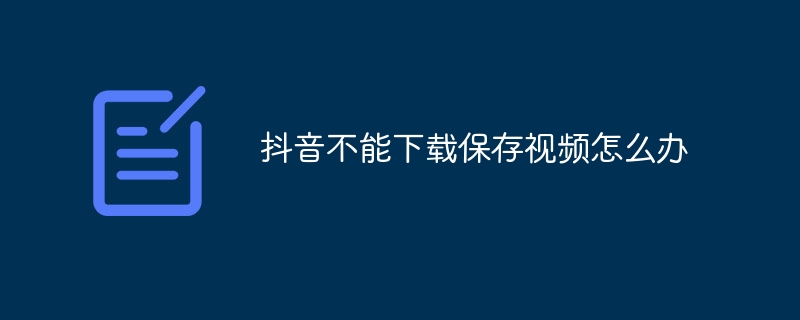 抖音不能下载保存视频怎么办Aug 24, 2023 am 11:07 AM
抖音不能下载保存视频怎么办Aug 24, 2023 am 11:07 AM抖音不能下载保存视频的解决方法:1、使用第三方应用,可以在应用商店搜索“抖音下载”或者“抖音保存”,会有很多应用提供这样的功能;2、使用屏幕录制工具,屏幕录制工具可以记录你手机屏幕上的所有操作,包括播放抖音视频,可以在应用商店搜索“屏幕录制”或者“屏幕录像”,会有很多应用提供这样的功能;3、使用链接下载,可以复制抖音视频链接,然后浏览器打开,再长按视频,选择“保存视频”。
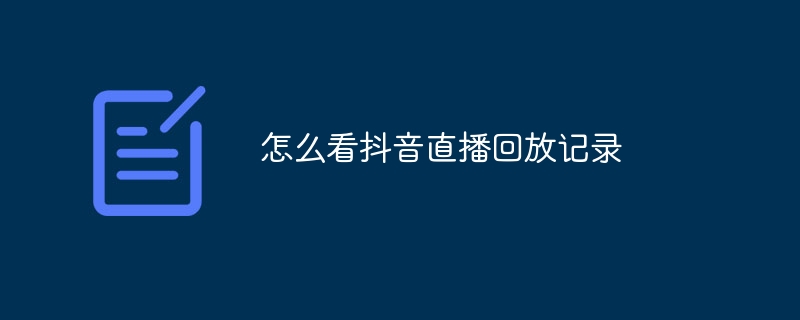 怎么看抖音直播回放记录Aug 25, 2023 am 11:35 AM
怎么看抖音直播回放记录Aug 25, 2023 am 11:35 AM看抖音直播回放记录的步骤:1、在抖音我的界面,点击右上角的三图标;2、在弹出的菜单里,点击创作者服务中心;3、接着点击主播中心;4、之后点击直播回顾;5、最后在直播回顾界面就可以查看到直播回放。
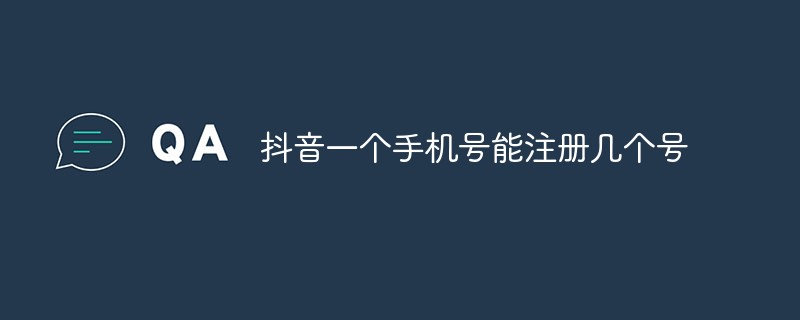 抖音一个手机号能注册几个号Mar 27, 2023 pm 02:11 PM
抖音一个手机号能注册几个号Mar 27, 2023 pm 02:11 PM抖音一个手机号能注册一个号,抖音注册新账号的方法:1、打开“抖音APP”;2、点击右下角“我”的按钮;3、使用手机号进行登录,在登录过程中完成“注册”即可。

Hot AI Tools

Undresser.AI Undress
AI-powered app for creating realistic nude photos

AI Clothes Remover
Online AI tool for removing clothes from photos.

Undress AI Tool
Undress images for free

Clothoff.io
AI clothes remover

AI Hentai Generator
Generate AI Hentai for free.

Hot Article

Hot Tools

SublimeText3 Mac version
God-level code editing software (SublimeText3)

SublimeText3 Linux new version
SublimeText3 Linux latest version

SecLists
SecLists is the ultimate security tester's companion. It is a collection of various types of lists that are frequently used during security assessments, all in one place. SecLists helps make security testing more efficient and productive by conveniently providing all the lists a security tester might need. List types include usernames, passwords, URLs, fuzzing payloads, sensitive data patterns, web shells, and more. The tester can simply pull this repository onto a new test machine and he will have access to every type of list he needs.

WebStorm Mac version
Useful JavaScript development tools

SublimeText3 English version
Recommended: Win version, supports code prompts!





